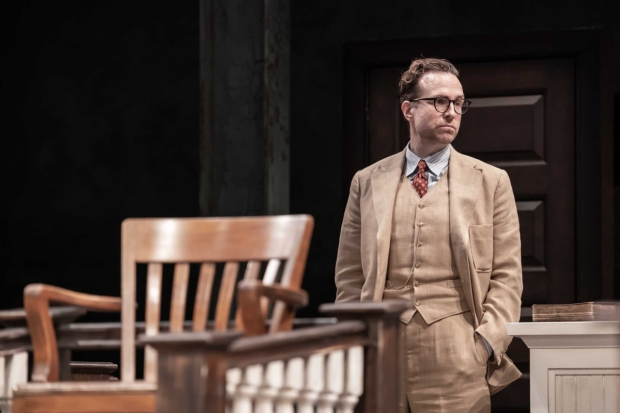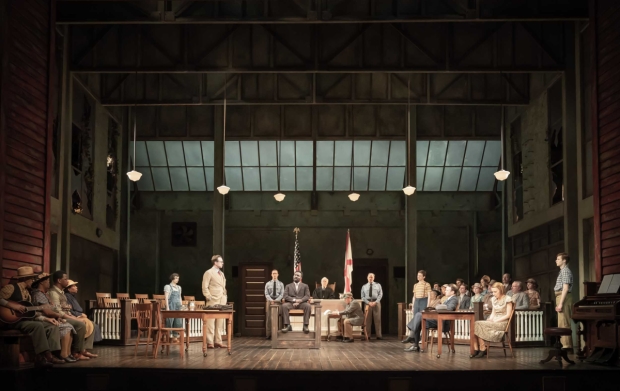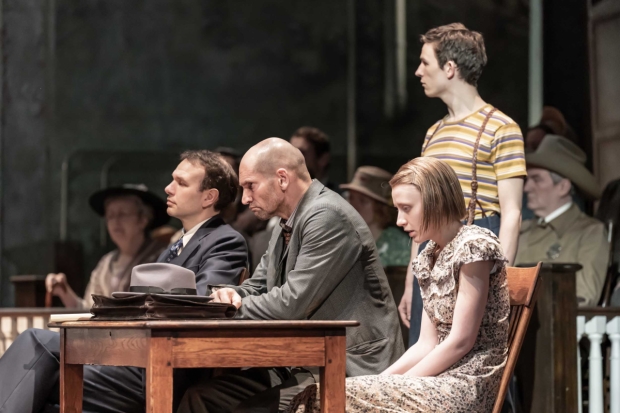To Kill a Mockingbird review – Rafe Spall brings Atticus Finch to the West End
Aaron Sorkin adapts Harper Lee’s text, with the production first seen on Broadway

© Marc Brenner
Harper Lee's To Kill a Mockingbird regularly used to top polls of people's favourite novels of the 20th century and it's still a set text in many schools. It's short, gently humorous, and hugely atmospheric as it tells a story of racial injustice and prejudice through the eyes of a young child, Scout Finch, who recounts her father Atticus's moral courage in defending an innocent Black man on trial for the rape of a white woman.
Set in Alabama, in 1934, it was written in 1960 and though it retains the descriptive power of a good story well told, many of its attitudes have worn badly. All its Black characters function only as a backdrop to the white saviourism of Atticus, a high-minded, small-town lawyer who gets paid in vegetables. Particularly in the 1962 film adaptation, starring Gregory Peck, Tom Robinson's fate is somehow less important than Atticus's nobility.
Aaron Sorkin knew this when he adapted the novel for the Broadway stage in 2018, and attempted both to give more agency to the Black characters – Robinson, on trial for his life, and Calpurnia, the Finch family's maid – but also to alter the balance of the text so that Atticus is shown as more fallible and the brutal racism revealed in the attitudes of the townsfolk is not part of the past but still entirely relevant today.

© Marc Brenner
The result, in Bartlett Sher's smooth, beautifully modulated production which arrives in London with Rafe Spall as Atticus, is an engaging and intelligently acted affair, staged with absolute authority on Miriam Buether's spare, brick-walled set, onto which the Finch family porch and the courtroom setting glide with ease.
Sorkin winds the crucial trial throughout the story which is told by three children – Scout, her brother Jem, and their kindly friend Dill. All are played, with wonderful conviction, by adult actors: Gwyneth Keyworth, Harry Redding and David Moorst. Their involvement in the story both points its meaning, but also heightens its emotion. The children's shock when they understand the evil that people do is our own.
Robinson – played with a dignity that barely conceals his agitation by Jude Owusu – is clearly innocent, yet he will always be found guilty, whatever the evidence, because he has dared to feel sorry for his bedraggled, frightened accuser Mayella (Poppy Lee Friar, plaintively fighting for her own sense of worth) who is beaten and sexually abused by her father Bob Ewell.
In this adaptation and in Patrick O'Kane's venomous performance, Ewell is not only a murderous abuser, and a KKK member but an antisemite too. His sheer, unreconstructed malevolence reveals both the arrogance and foolishness of Atticus's suggestion that to understand a person you have to live inside their skin. Calpurnia – a powerful Pamela Nomvete – stands opposed to that; she knows that some people are beyond understanding and respect. "People shouldn't have to live in fear right where they live," Atticus says at one point. "Let me see if I can relate to that," she shoots back.
Her presence does help highlight even Atticus's engrained assumptions, though the sibling relationship suggested between them warrants incredulity. And some of Sorkin's modifications create more problems than they solve. Though Spall credibly understates his playing, creating an Atticus who is as flawed as he is brave, his final speech in the courtroom is a typical piece of Sorkin-type grandstanding, which detracts from his essential belief in justice and his plea for everyone to rise to its level.

© Marc Brenner
Perhaps because of this, the conviction of Robinson – and the tragic events that flow from it – don't land with the shocking weight that they should. You feel the production should pause just to register the horror that has unfolded.
But as it progresses, it accelerates, straining for its effects, trying to tie the fate of its characters – where the children are saved, but Robinson is not – into a tidy, all-encompassing package with a neat tableau and a hymn. The effort begins to show and the conclusion disappoints. Mockingbird remains, as it always has been, a terrific tale – but not quite the overwhelming, weighty experience it wants to be.












